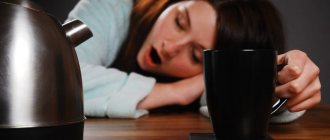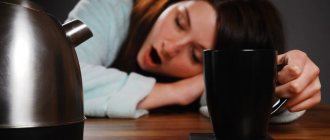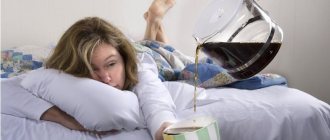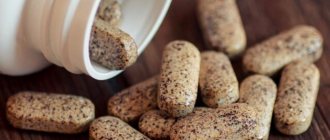How coffee affects the body
The composition of coffee beans is unique, and it is this that explains how a person feels after drinking the drink. The beans contain a natural biostimulant - caffeine, which gives vigor and freshness of thoughts. In addition, the composition contains proteins, amino acids, and polysaccharides, which are necessary for health.
But everything should be in moderation. If you drink a lot of coffee at once, the body will begin to malfunction, and signs of an overdose of caffeine and other active substances will appear.
It has been proven that a person whose body is relatively healthy by drinking coffee in moderation receives benefits. What does coffee do?
- It has a stimulating effect on brain activity, which speeds up thinking.
- Speeds up the metabolism in the body, which helps with weight loss, and in principle is good for the body.
- A person who drinks coffee is able to process the information received faster.
- General muscle tone increases after a cup of coffee.
- Hormones that are responsible for vigor and pleasure - dopamine, adrenaline and serotonin - begin to be produced more actively.
- Digestion improves.
- Blood circulates more actively.
The beneficial effects can only be felt with moderate consumption of the drink and using only natural grains for brewing. What happens if you drink a lot of coffee?
The effect of coffee on the human heart
Whether coffee is beneficial or harmful is a controversial issue even for modern scientists who have already conducted hundreds of laboratory studies and experiments. Coffee became a popular drink in the 17th century: as soon as they began to drink more of it, they noticed that there was a correlation between frequent consumption of this drink and deterioration of health, poor heart function.
Experts note: if you drink 2 small cups of coffee during the day, it will not have a negative effect on the heart and body as a whole. But if you eat a lot of coffee, problems with the heart, blood vessels, gastrointestinal tract, central nervous system may begin, and tooth enamel will begin to crumble. If your heart starts to hurt, you need to give up coffee immediately. According to scientists, high-quality coffee can have both positive and negative effects on the human body. Its effect is individual, depending on the body of a particular person, on how much coffee is consumed per day and what is in its composition.
What happens if you drink a lot of coffee at once?
After drinking too much coffee once, a person begins to feel strange. The sensations are unpleasant and are associated with the accumulation of caffeine in the body. The action of the biostimulant begins approximately 15 minutes after drinking the drink. The peak is reached after forty minutes to an hour, and then begins to slowly subside.
It will take 4 to 6 hours for the caffeine resulting from drinking one cup of coffee to be completely neutralized. The interval between consumption of the drink should be at least 4 hours. What happens if you drink too much coffee in a row? There will definitely be an accumulation of excessive amounts of caffeine in the body, that is, an overdose.
Lethal dose of coffee
Children, pregnant women, and people with cardiovascular diseases are at risk of caffeine overdose. Nursing women should use the drink with caution (no more than 200 mg of caffeine per day). For children and adolescents, a daily dose of 3 mg of caffeine per 1 kg of body weight is recommended.
A lethal dose of coffee for a person weighing 70 kg for a single dose corresponds to 10-14 g of caffeine . But to the question “can you die from coffee,” the correct answer is negative, since to do this you will have to drink an unrealistic amount of liquid:
- brewed coffee contains 450 mg/l of caffeine, that is, the lethal dose for humans corresponds to 90 cups (240 g each),
- in an instant drink the concentration is lower: 300-400 mg/l, so you can get poisoned from about 120 mugs,
- for espresso with a high content of the substance (1700-2200 mg/l), the lethal dose is 100-130 cups (45 ml each),
- popular energy drinks contain on average 350 mg/l of the substance, and the lethal volume of the drink is about 120 cans (240 ml each),
- tea, depending on the variety and method of brewing, contains 180-420 mg/l of the substance, so you need to drink from 100 to 230 mugs to worry about the transition to another world,
- natural hot chocolate contains 430 mg/l of the substance, and the lethal dose is 97 cups (240 ml each),
- Cola contains an average of 100 mg/l of caffeine, and drinking 200 bottles at a time (500 ml each) is life-threatening.
What happens if you eat a spoonful of coffee? Drinking a large portion of instant coffee once increases body temperature - this is how the body reacts to concentrated caffeine. If you eat more than one teaspoon of coffee, but 2-3 at a time (without water, just chew and swallow), you can cause a temperature rise of up to 38 °C. The temperature will begin to rise within 20 minutes after consuming the granules, the effect will last no more than 40 minutes.
Overdose symptoms after drinking large amounts of coffee
If you drink not one, but several cups of espresso in a short period of time, the following symptoms will appear:
- trembling in hands;
- too fast heartbeat;
- the blood vessels of the brain will sharply narrow, you will feel tired, weak, and even fainting is possible (by the way, some people mistake such symptoms for a lack of energy and aggravate their situation by taking another portion of the biostimulant);
- possible diarrhea and nausea;
- dehydration, symptoms of which include dry mouth, confusion and dizziness;
- breathing becomes rapid and shallow, a feeling appears as if there is not enough air;
- a person begins to sweat even without physical activity.
You need to know moderation in everything. If you drink coffee and experience at least one of the above-mentioned sensations, then under no circumstances should you repeat the serving. As already mentioned, often this symptomatology is perceived by people as a demand from the body to cheer up.
Coffee and hormones
Excessive love for coffee
It also affects hormonal levels.
The fact is that the drink stimulates the production of the hormone cortisol.
. The latter is produced in the morning and is responsible for activity and vigor, and in large quantities causes stress.
Important!
Additional coffee stimulation of cortisol production can lead to increased blood pressure, increased heart rate and anxiety.
To overabundance of stress hormone
did not happen, the body inhibits natural production, almost completely relying on an external pathogen.
Ultimately
, drinking coffee daily on an empty stomach will lead to serious disruptions in the production of cortisol.
Important!
The invigorating drink also affects other hormones. For example, coffee can suppress serotonin production.
Regular alcohol abuse
We told you what symptoms appear if you drink a lot of coffee. What will happen to the body if you constantly “sit” on this aromatic drink? Many people really don’t understand that the body is in danger, and drink several mugs of coffee a day, pouring a new one almost as soon as the previous one runs out.
If you abuse caffeine daily, the central nervous system will be overloaded to the limit. The body will begin to work in a constant state of stress, and stable stimulation of hormone production (adrenaline, dopamine and serotonin) will lead to exhaustion of the nervous system.
In most cases, regular coffee abuse leads to addiction, when a cup of the drink is simply necessary, not to cheer you up, but to feel “good.”
What happens if you drink a lot of coffee consistently? The body's reaction to the drink will be the opposite of what it should be with moderate consumption.
What are the dangers of an overdose of coffee and the symptoms of overdose?
It is important to note that overdose and chronic caffeine abuse are completely different phenomena, but both are quite dangerous. To maintain a cheerful mood, a person can drink several mugs of coffee at a time.
If for some this seems like a brilliant idea, then for others it is clear that such an action will certainly lead to an overdose of caffeine. You can distinguish the state of abuse of this drink by some signs:
- Heart rate increases.
- Possible dizziness, lightheadedness due to constriction of cerebral vessels.
- Feeling nauseous.
- Gastrointestinal disorder.
- The appearance of severe heartburn, especially when drinking coffee on an empty stomach.
- Exacerbation of peptic ulcer disease.
Symptoms of coffee addiction
If a person consistently drinks coffee in large quantities, then over time he will begin to notice unpleasant symptoms:
- Without coffee, the body simply refuses to work normally: there is no vigor, there is constant fatigue, confusion of thoughts.
- Even with such “fatigue” you will suffer from insomnia.
- Your appetite will become poor.
- The person will be constantly irritated.
- Chronic diseases will worsen due to the weakening of the body by caffeine.
- Dizziness will become habitual, trembling in the hands will become stable.
Who should not drink coffee: 9 cases when it is better to refuse the aromatic drink
People suffering from insomnia should not drink coffee in the afternoon. After drinking a cup, they will not be able to sleep at all. Hypertensive patients should completely avoid it, as it raises blood pressure.
It is not suitable for people with stomach ulcers, duodenal ulcers and gastritis. It will lead to increased acidity of gastric juice.
People with mental disorders need to drink decaffeinated coffee, it will cause less harm. The aromatic drink not only invigorates, but also increases anxiety and adds panic.
What are the dangers of drinking too much coffee all the time?
We described the first symptoms indicating an excess of coffee in the body. If you do not pay attention to the body’s signals and continue to drink the drink in the same way, serious consequences may arise:
- The pressure will begin to rise steadily. It cannot be normalized by taking a pill, because caffeine neutralizes the effect of the medicine.
- The risk of developing cardiovascular diseases increases. Our “engine” already works quickly, and if it is also stimulated, forcing it to beat even faster, then we can get a heart attack as a “token of gratitude.” This is the worst consequence of sustained caffeine abuse.
- Headaches will begin to bother you. Moreover, the migraine will be so severe that not a single drug will help. Constantly experiencing severe pain, a person simply will not be able to work normally; he will feel internal anxiety, tension and irritability.
- Glaucoma develops.
- The vessels narrow, which is bad when the heart is working vigorously and the blood flow is active.
- Coffee aggravates the situation for people with gastrointestinal diseases.
- Over time, your teeth will turn yellow and your skin will become looser and grayer.
- Your nails will peel and your hair will fall out.
It is worth paying attention to such factors under which it is not recommended to drink coffee:
- drinking a drink before or after drinking alcohol - intoxication will become even stronger;
- drinking coffee along with nicotine is a high risk of developing hypertension;
- coffee and sedatives are contradictory substances, which means that the sedative simply will not work, because it is neutralized by caffeine.
The worst consequence of excessive coffee consumption is death as a result of exhaustion of the body due to stable heart failure and respiratory failure.
Should you drink coffee every day: the benefits of the drink
Many doctors say that if you drink coffee every day, you can:
- Protect yourself from certain types of cancer. Caffeine reduces the risk of cancer, protects cells from damage, and reduces inflammation.
- Fills the body with antioxidants. It contains more antioxidants than fruits, vegetables and green tea. Heat treatment does not reduce their level, but makes it higher. Increased levels of free radicals in the body lead to premature aging, disruption of the brain and immune system. When a person constantly fills the body with antioxidants, it reduces their harm.
- Improve blood circulation. It activates blood flow, saturating internal organs and the brain with oxygen. It increases mental performance. Regular consumption of coffee will help prevent Alzheimer's disease.
- Cheer up. More and more people are turning to psychologists for depression. Its first sign is apathy. Coffee is a mild antidepressant; it enhances the production of the happiness hormone, reduces tension, and gives a positive mood. It is enough to just inhale the aroma. Doctors recommend that after an anxious night caused by insomnia, take a bag of grains with you and periodically inhale its smell. This will reduce stress from lack of sleep.
- Get rid of suicidal thoughts. According to information from the Harvard School of Public Health, numerous studies have shown that coffee reduces the risk of suicide by 50%. It is an antidepressant. Helps the body produce serotonin, norepinephrine and dopamine.
- Improve athletic performance. Caffeine is often recommended for athletes to consume before exercise because it improves endurance and increases the level of fatty acids in the blood. And they are fuel for muscles. Fatty acids reduce the amount of carbohydrates burned, endurance increases, and training time increases.
- Improve brain function. Coffee taken in the evening invigorates and increases mental activity. Therefore, people who work night shifts need to consume it frequently. Caffeine improves reaction, increases vigilance and attention, and has a positive effect on logical thinking.
- Improve intestinal microflora. A cup of coffee in this case acts as a probiotic. It activates the production of gastric juice, which improves digestion and absorption of nutrients by the body.
- Reduce the risk of liver pathology. Reduces the development of cirrhosis by 20%. If you drink tea or coffee daily, this will prevent the development of fatty hepatosis and improve liver function.
- Reduce the risk of developing diabetes. If you drink natural coffee every day, you can reduce the likelihood of developing type 2 diabetes by 15%.
Doctors recommend drinking coffee for people with Parkinson's disease. It will help them control their movements. They claim that people who regularly consume caffeine reduce the likelihood of developing this disease.
Is it harmful to drink coffee from beans every day? Not unless it's strong and freshly brewed. The popular soluble option does not benefit the body.
The disadvantages include:
- Coffee addiction. Drinking the drink in large quantities is considered a bad habit. If a person drinks more than two cups a day, he becomes addicted. He cannot function fully without a new dose of caffeine.
- Student urges. Coffee is a diuretic drink. It also irritates the intestinal microflora, causing severe thirst. This effect is enhanced by the addition of cream and syrups.
- Insomnia. They drink coffee to cheer themselves up. If a person takes it before bedtime, it will be difficult for him to fall asleep. The last cup should be drunk 6 hours before bedtime.
- Impact on the nervous system. A person’s pulse quickens and their blood pressure rises.
If you drink more than 3 cups of coffee every day, this will negatively affect the absorption of B vitamins. They are responsible for the functioning of the central nervous system. Caffeine also removes calcium from the body. This can trigger osteoporosis and reduce bone strength. For the same reason, it should not be consumed by pregnant women. Coffee will negatively affect the formation of fetal bones.
You should not drink it when losing weight. It slows down metabolic processes. It also provokes the production of the hormone cortisol, which leads to insomnia. Lack of sleep hinders weight loss.
Not everyone likes coffee beans, so the question arises: what will happen if you drink instant coffee every day. The freeze-dried drink contains slightly less caffeine. But it contains dyes. Manufacturers add them to make the color of the drink similar to natural. Dyes can stain tooth enamel, making it appear more yellow. And no matter what fans of freeze-dried drinks say, it will not be the best replacement for natural ones.
It has a high acid content. Drinking instant drinks frequently is dangerous because it causes acidity in the mouth, saliva and gastric juice. This destroys the enamel, so after drinking a cup of coffee, you need to rinse your mouth with clean water.
Also, increased acidity can cause heartburn. Which can lead to ulcers, gastritis. For women and men with such diseases, coffee will only complicate their course.
Before we talk about the benefits of coffee and look at some of the research that points to it, I want to convey one important point to you.
Coffee affects each of us completely differently.
And while ample evidence shows that coffee can have a positive effect on life expectancy and reduce the risk of developing serious diseases, we should remember that coffee can be both very beneficial for some people and very harmful for others.
Because despite all our similarities, we continue to be different. And the only working way to understand whether you should drink coffee is to take a comprehensive approach to this issue.
First, you should pay attention to the symptoms that occur after consuming it. Is there irritability, lethargy, hyperexcitability, insomnia?
Secondly, you need to make sure that you are not part of the group of people who should not drink coffee (temporarily or at all) for various reasons. I will list them a little later.
Thirdly, those who are especially advanced and love to get to the very essence can take a genetic analysis. This will help you understand how quickly your body absorbs the caffeine it receives.
We will talk about all this later in the article. But we’ll start with research on the benefits of coffee.
Over several decades, many studies have been conducted on the benefits of coffee. As a result, we found that it can not only reduce the risk of developing diseases of the cardiovascular system and oncology, but also slow down aging and serve as a preventive measure for Parkinson’s disease and depression.
Moreover, two large studies published in July 2017 (Annals of Internal Medicine) suggested that drinking coffee in general may reduce mortality. This pattern and relationship “coffee consumption - increased life expectancy - decreased mortality” was observed among various European populations, races and ethnic groups. (1)
Let's talk about the benefits of coffee in even more detail.
In the previous part of the article, we spoke so confidently about all the benefits that coffee can bring to our lives. Then what's the point of giving it up?
Here's what it is. Each of us is individual. There are important differences between us, which can play a decisive role in the case of drinking coffee.
Genetics, gut microbiome, lifestyle, diet, activity level, stress level, constant fatigue, gluten intolerance, headaches - all these factors determine how our body reacts to coffee and caffeine. Sometimes they force us to give up coffee completely or significantly reduce its consumption.
And again, this is really important to consider. Drinking coffee regularly if the factors listed below are present is a truly bad idea.
The temptation to drink coffee heavily to cheer yourself up when you are constantly nervous, worried and stressed is great, but you shouldn’t do that. Coffee activates stress hormones and suppresses actual feelings of fatigue.
The fact is that small doses of caffeine (up to half a cup) will have a relaxing effect on the body by reducing the activity of neurotransmitters. But large doses, on the contrary, will cause irritability, anxiety and, paradoxically, increase stress levels.
In addition, coffee can mask and ultimately worsen chronic fatigue syndrome. It’s worth thinking about seriously if you constantly feel tired and don’t get enough sleep. You also notice a sharp loss of strength after lunch and take a long time to recover from physical activity.
In general, if you often find yourself in a state of stress, then you need to gradually and gently give up coffee. By the way, chronic diseases are also constant stress for our body. Gradually and gently are the key words! If you do this abruptly, you may feel very bad for several days (we are talking about severe headaches, irritability, etc.).
Sometimes figuring out whether you should drink coffee is quite simple. You just need to get tested for the CYP1A2 gene and find out how well your body tolerates coffee.
I'll tell you a little more.
Caffeine is metabolized by an enzyme in the liver that is encoded by the CYP1A2 gene. Unfortunately, some people have a variation in the CYP1A2 gene, which causes them to process caffeine slowly.
If you have this particular gene variation and drink coffee, you increase your risk of developing cardiovascular disease (24), high blood sugar (25), high blood pressure (26) and interfering with the quality of your sleep.
To find out if you are a fast or slow metabolizer, you need to get tested for the CYP1A2 gene at a genetic health center. To do this, go to the website of the laboratory or genetic center and enter “CYP1A2” or “rs762551” in the search bar.
An important caveat: It's good to use this analysis as your starting point, but it's worth remembering that there are a number of factors beyond CYP1A2 genotype (which I wrote about in the article) that influence how each of us metabolizes caffeine. This is why even fast metabolizers may react poorly to coffee if they have chronic fatigue.
I drank a lot of coffee and feel bad: what should I do?
You need to immediately begin removing caffeine from your body before more serious, life-threatening symptoms begin to appear. How to do it?
- The first step is to rinse the stomach to remove the remaining coffee before the substances from it are absorbed further.
- Next you need to take a sorbent and a saline laxative. Activated carbon is required; it will help remove unabsorbed remains of the drink.
- If a person has lost consciousness or started to delirium, there is no time to waste on “pushing” drugs into him. In this case, you need to quickly deliver the caffeine poisoned person to intensive care.
If the symptoms are not too obvious, you just feel a little uneasy, trembling appears, then after taking the pills you need to eat a hearty meal. It should be fatty food, cutlets, hamburger, thick soup are suitable.
If you want to get rid of coffee addiction, then give up the invigorating drink altogether for a long time. If you like its taste and your mouth starts watering when the aroma of coffee comes from the next apartment, brew chicory. The taste is quite similar, but this drink will not harm you.
We talked about what happens if you drink a lot of coffee. Think about your health, drink this aromatic, invigorating drink within normal limits, if there are no contraindications.
How to drink coffee every day and not gain weight
Reduce or eliminate sugar and cream in your coffee. As long as you limit cream and sugar, coffee will not be fattening like other caffeine-based substances such as energy drinks and sodas. The calorie content of a simple cup of brewed coffee is quite low.
Adding too much cream or sugar to your coffee can dull some of the beneficial effects of the product. We know that sugar has adverse effects. Even if you add sugar and don't exceed your caloric needs, you are still "negating" some of the benefits because sugar is a negative food ingredient.
Should you drink coffee every day: the benefits and harms of the drink











